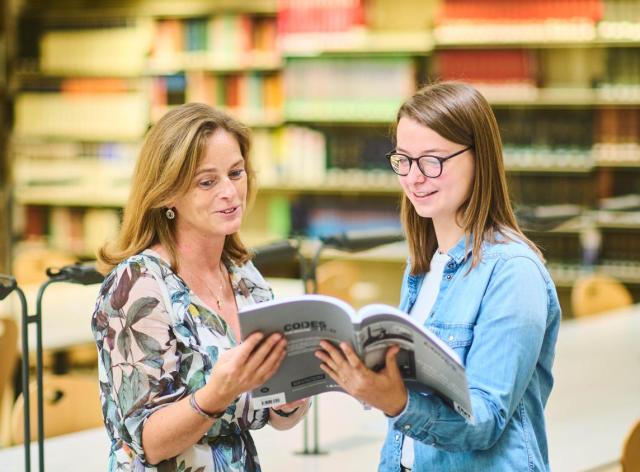Do you have what it takes?
Test and improve your knowledge and skills with "Passeports pour le bac".
Understanding text and expressing yourself correctly are essential skills for lawyers. Right from the start of your first year, "Passeports pour le bac" enable you to compare your skills with those expected by your teachers.
You can assess:
- your language skills: reading and understanding a text, writing a text on a legal theme;
- your general culture.
Following these tests, the Faculty offers you sessions and workshops to reinforce:
- your reading strategies;
- your written expression.
Individualized follow-up is also offered. Right from the start of the year, you'll be able to fill in any gaps and boost your success. Results are not taken into account in your end-of-year assessment.
Are your methods appropriate?
Develop effective strategies to promote your success.
Working methods sessions are organized to familiarize you with university learning techniques, such as:
- taking clear and comprehensive notes;
- summarizing and synthesizing subjects;
- understanding subjects in depth;
- memorizing large amounts of information;
- managing your time during class periods and blockades;
- organizing your work;
- anticipating teachers' requirements.
In addition, if you encounter difficulties in your study method, the cellule interfacultaire d'appui pédagogique offers you individual follow-up. Throughout the year, an advisor is on hand to review your study methods and techniques and help you improve them.
In addition, if you are recognized as students with special needs, you can be supported throughout your course and benefit from reasonable accommodations tailored to your particular situation.
How to overcome difficulties?
The Faculty offers you individualized help from a tutor, monitorats and individual follow-up by a specialized pedagogue.
The tutor
You can benefit from personalized help from a second or third year block student who has received specific coaching training and acts under the supervision of the Faculty's pedagogical coordinator.
These tutors guide you through your studies. They listen to you, advise you, help you understand your subjects and interpret your results. If necessary, they'll refer you to the appropriate resource people.
Monitorats
Monitorats are sessions organized for around 100 students at a rate of two to three sessions for more specialized subjects. They aim to re-explain and synthesize material seen in lectures, as well as to prepare you for tests and exams with the help of questions and answers, diagrams, document commentaries...
And for students who have to present a second session, revision sessions are organized during the summer vacations.
Individual support
The Faculty of Law also organizes specific educational support in the form of preparatory sessions for the blockade and written exams, and individual interviews for methodological advice. You can be accompanied by a pedagogue specialized in the difficulties specific to law studies through individual appointments, email advice and/or group "coaching" sessions.
Furthermore, the teaching staff, assistants and administrative staff are committed to being available for every student, particularly during lectures or at the stand-by sessions organized several times a week.
What resources are available to you?
Library, computer rooms, e-learning tools and videos accessible online: invaluable resources.
The library, for a lawyer, proves as important as the laboratory for a chemist.
To be a good lawyer is above all to be able to find the relevant information for resolving a dispute, drafting a contract or advising an investor; it means being able to identify the applicable regulations, the appropriate case law, the relevant doctrine.
The Faculty of Law library provides free access to legal collections and works. Electronic legal documentation is also available. The use of this particular source of documentation is specifically taught to you. Computer rooms are open to students, and the library is also equipped with WIFI access.
The Faculty of Law is also equipped with state-of-the-art tools to support different learning methods (e-learning platform "WebCampus", videoconferencing tool, course recording system...). For example, some class sessions are filmed and made available on the "WebCampus" platform, which also features exercises. Pedagogical videos (how to use the law code, etc.) and in-depth videos (interviews with experts, etc.) are also available online. This allows you to review, at your leisure and at your own pace, the presentation made in the audience.
Educational videos
Video vignettes produced by teachers give you a better understanding of legal concepts and know-how. More information
How can you prepare for writing an academic paper?
At the start of the second term, several writing workshops are organized. The aim of these workshops is to support you in writing your first academic paper, and to be able to lay the necessary foundations in preparation for the methodology (in the second year) and end-of-cycle (in the third year) papers. Each session is given in small groups.
How can you prepare for the exams?
Study regularly, acquire good methods, but also get to know the teachers' requirements and their way of questioning.
In the first year, formative assessments are organized at the beginning of November in certain subjects. Teachers correct your papers, comment on them and organize group or individual correction sessions with assistants. These tests do not play a part in the marks awarded at the end of the year. They are merely a training tool, enabling you to appreciate the high standards set by your teachers, and to judge the effectiveness of your work and your ability to handle an examination situation.
As soon as you start your studies, you will also benefit from specific preparation for oral examinations.
After the first year, you will adapt your effort more effectively to the nature and importance of each subject on the syllabus. As a result, you no longer benefit from regular questioning, other than as part of the exercises.
Exam organization
January, June and, if necessary, August... three sessions to prove your mastery of the subjects.
In January, you sit the exams on the 1st term courses. If you fail, you can retake the relevant exam in June and/or August-September. Three chances to succeed, but only in the first bachelor's year. From the second annual block onwards, any exam failed in the January or June session is automatically carried over to the August-September session.
According to the choice of teachers, exams may be assessed in writing and/or orally. Assessment procedures are detailed on the university website and specified during the first class.





